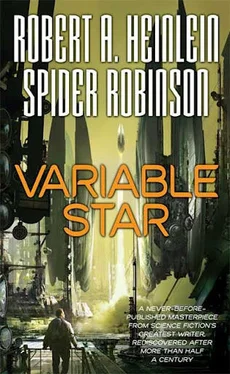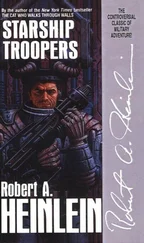I didn’t get it all out—didn’t come close—but I made a start.
I actually didn’t hear the applause; Herb told me about it later.
I left the Horn of Plenty that night minus about a million kilos I’d been carrying on my shoulders… and with a steady gig, two nights a week, Tuesdays and Fridays, for a scandalous sum, tips, and all I could eat. Plus the private phone codes of three Relativists. Four, since London and George R lived together.
On the down side, I also left without finding out who had been playing that piano. Nobody seemed to know. The sound source had apparently been the house MIDI system—but the originating keyboard might have been in a sealed booth somewhere in the Horn, or up in the Control Room, for all anyone could tell me. All I could positively rule out was a player back in the Solar System… because our communication had unquestionably been conducted in real-time, without any lag at all. So I didn’t worry about it. I had twenty years to find him. He could hide, but he couldn’t run.
On our way back to our room, I tried to thank Herb, to explain just how much he’d unwittingly done for me, but he brushed it away. “I think everybody made out on that deal,” he said. When I pushed it, though, he allowed me to promise to bring home a doggy bag on Tuesday and Friday nights. And perhaps a doggy bulb of good Scotch.
After half an hour at his desk, Herb gave me a data cube and suggested I play it privately. I did so at once, so I could stop thinking about it.
It was little Evelyn Conrad, back in the Solar System. Audio and video, stereo both ways. She told me gravely that I was very welcome. She said she was very cross with her gran’ther for making me go away. She said she was going to marry me one day, just the same. She told me not to marry anyone else without checking with her, first. She gave me a “private” mail address, but warned me it was not totally secure. And she closed with a solemn Bon Voyage and a blown kiss. By that point I was grinning and crying at the same time. I popped out the cube, stretched out on my bunk, and slept like a stone for thirteen hours. And when I woke, rude things and implausible suggestions had been written all over my face and hands with a laundry marker. I guess I snore.
The squeaking of the pump sounds as necessary as the music of the spheres.
—Henry David Thoreau
The first thing I did when I woke next morning was to sit down at my desk and summon a list of Positions Available.
There were a lot more than I expected. It had apparently occurred to the expedition’s planners that not only could nearly all the actual useful work of preparing to start this colony be safely put off until the last few years of the voyage… it probably would be anyway, humans being human. Therefore, it would be good to keep them all occupied doing some damn thing or other for the first eighteen or so years. Lots of helpful suggestions had been provided. The full list of jobs the Colonial Authority was willing to pay someone to do took well over three hours just to scroll down through at normal reading speed.
But basically most of them broke down into categories you could skim in less than half an hour, if you were a fast reader. Here’s a typical screen’s worth, which was sent in response to my query by an astronomer named Matty Jaymes:
• Refining knowledge of the location and plasma properties of the heliopause between the solar wind and the interstellar medium, on the way out of town—and then the same for the heliopause of Immega 714 when we got there.
• Again as we were leaving, helping refine our comet map of the Oort Cloud, detecting comet nuclei with radar.
• Once we were good and gone, measuring, in situ, the density, charge, mass, species, velocity, and temperature characteristics of interstellar plasma and gas.
• Continuous measurement of the orthagonal components of the galactic magnetic field.
• Continuous monitoring of the interstellar medium for molecular species. Determination of mass, composition, size distribution, and frequency of interstellar grains. Performance of interstellar erosion experiments with various models of shield configurations.
• Using the long baseline formed by the starship and Solar System to carry out high-resolution astronomical measurements with optical and radio interferometry. Performing astrometric measurements of nearby stars, extrasolar planet detection, extrasolar planet imaging, and atmospheric spectroscopy. Using the same long-baseline techniques for astrophysical measurements, for example, to image radio galaxies, quasars, and neutron stars.
(It had long been hoped that with multiple starships under way at the same time, the capability of this long baseline interferometry could be vastly enhanced by combining their observations of distant sources. It didn’t seem to be working out well: the problem in this kind of interstellar interferometry was how to agree on common time-tagging of data from probes moving in different directions at significant fractions of the speed of light.)
• Observation of low energy cosmic rays, normally excluded from the Solar System.
• Attempting detection of gravity waves from astrophysical processes such as supernovae or neutron stars, by tracking anomalies in the Doppler effect of our signals.
• Refinement of the dark matter map of the Galaxy…
…and so on. Mind you, all these are from the list of jobs Dr. Jaymes figured he could train just about any chimp aboard to do satisfactorily. But before he sent me those, he sent another, shorter list of jobs for especially smart people, with specific qualifications, which I won’t even bother to excerpt, because I didn’t understand it.
He appeared to be saying that he wanted to make an extremely intensive examination of the sun— our sun—okay, our former sun—of Sol, all right?—even as we were leaving it behind us forever at high speed. Why, I couldn’t imagine. You’d think if there was an adequately studied star in the universe, it would be Sol. Studied even from vessels receding at fractions of c, if that made some sort of difference. And information about that particular star was going to be of purely academic interest to anyone we would ever meet again. But Dr. Jaymes certainly sounded terribly concerned about it. When I told him I lacked the qualifications for his first list of jobs, he allowed his disappointment to show even through mail; whereas when I politely declined his second list, too, he didn’t seem to care one way or the other.
Now, I don’t know about you, but if I had been forced to pick one of those I just listed as my shipboard occupation, I think the option I’d have selected instead would have been euthanasia. Like any literate citizen, I love to read what astronomers have to say after years of patient data collection and astute analysis… but the actual gathering of the data was not my idea of a way to spend the next twenty years.
When I came right down to it, not much was.
It was that growing realization, about five or ten scrollings down the list, which caused me to stop and approach it from the other direction. Instead of wading through the Big List of Jobs, the sensible way to do this was to make a Small List of Jobs I would be willing to endure for twenty years, if I had to, and then see if by chance any of them were on the Big List.
By dinnertime I had settled on the following:
• Teach the saxophone. Or composition. Or music history. Or history.
But did I in fact have any pedagogic skills? Forget the skills: did I have the talent ? The indefinable intangible something that would make strangers find learning from me preferable to learning by themselves? How the hell did I know?
Читать дальше










